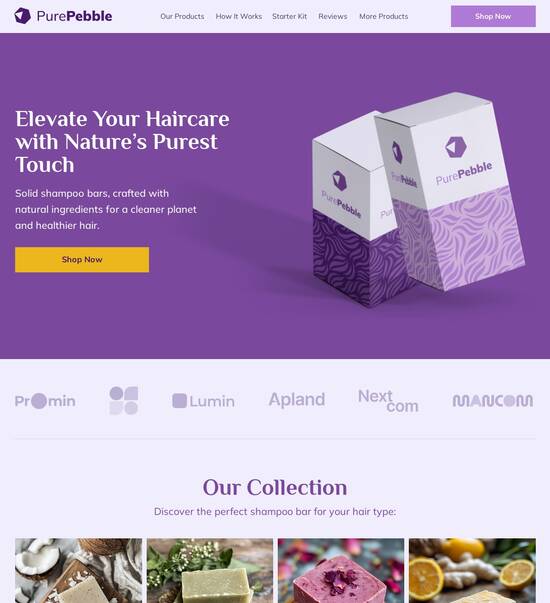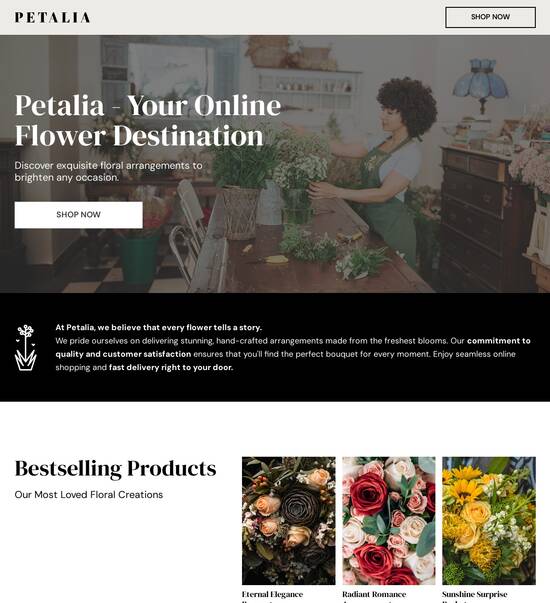
Simple web page templates
Use TemplateAbout template
Master the art of web design with simple web page templates. Transform your business today!
Recommended templates

Easy to build without coding
With the intuitive drag-and-drop builder, anyone on your team can create high-converting pages without any knowledge of code or design. Make enhancements to your landing page with custom widgets using Javascript, HTML/CSS, or third-party scripts.

Multiple layouts for any industry and goal
Select from 500+ landing page layouts built to boost conversions across industry-specific scenarios. Customize them by adjusting fonts, adding images, and generating on-brand content with the AI assistant. Quickly scale with Instablocks® and Global Blocks that you can save, reuse, and update globally.

Loads fast and looks polished on any device
Every template is responsive, which means they present professionally on any device and load blazingly fast with our Thor Render Engine. You can also power them up with Google AMP technology to deliver an unparalleled mobile experience and drive higher conversions.

Robust analytics & experimentation
Get real-time updates and reporting across all your devices, showing the number of visitors, conversions, cost-per-visitor, and cost-per-lead. Launch AI-powered experiments, run A/B tests, and use heatmaps to analyze user behavior, then optimize your landing page to maximize conversions.







Easy to build without coding
With the intuitive drag-and-drop builder, anyone on your team can create high-converting pages without any knowledge of code or design. Make enhancements to your landing page with custom widgets using Javascript, HTML/CSS, or third-party scripts.
Multiple layouts for any industry and goal
Select from 500+ landing page layouts built to boost conversions across industry-specific scenarios. Customize them by adjusting fonts, adding images, and generating on-brand content with the AI assistant. Quickly scale with Instablocks® and Global Blocks that you can save, reuse, and update globally.
Loads fast and looks polished on any device
Every template is responsive, which means they present professionally on any device and load blazingly fast with our Thor Render Engine.
Robust analytics & experimentation
Get real-time updates and reporting across all your devices, showing the number of visitors, conversions, cost-per-visitor, and cost-per-lead. Launch AI-powered experiments, run A/B tests, and use heatmaps to analyze user behavior, then optimize your landing page to maximize conversions.
All the features you need to build lead-generating landing pages
Explore more featuresLearn how to build top-performing landing pages for any goal
FAQs
Leading the way in building high-performing landing pages





Create high-converting landing pages with Instapage's powerful platform
Instapage offers a robust solution for marketers aiming to excel in landing page creation and conversion rate optimization. With a user-friendly interface and customizable templates, Instapage enables businesses to effectively accelerate their digital marketing campaigns. This guide provides a step-by-step approach to maximize your landing page effectiveness using Instapage.
Understanding the Importance of Landing Pages
Effective landing pages are crucial for capturing leads and driving conversions. They serve as dedicated platforms where visitors can engage with your offer, whether that be a lead magnet, product, or service. Leveraging Instapage’s features, you can create tailored landing pages for your specific audience segments, whether you operate in business services, advertising, or financial services.
- Clear Call-to-Action (CTA): Ensure that your CTA stands out and compels users to take immediate action.
- Concise Content: Deliver your message succinctly to maintain user interest while providing value.
- Visual Appeal: Use high-quality images and layout designs that resonate with your brand identity.
Step 1: Choose the Right Template
Instapage offers over 100 high-converting templates tailored for various marketing needs. Selecting a template that aligns with your campaign goal is the first step in maximizing conversions.
- Select a template focused on lead generation to optimize capture rates.
- Choose designs that align with your brand's messaging for consistency.
- Utilize templates that incorporate existing high-performing elements, ensuring they resonate with user expectations.
Step 2: Customize Your Landing Page
Customization enables you to align your landing page with the targeted audience's interests, employing dynamic content for personalization.
- Add dynamic text replacement to make visitors feel that the content speaks directly to them.
- Integrate visual elements like videos or infographics that illustrate your product or service's benefits.
- Utilize A/B testing features to determine which designs or copy resonate best with your audience.
Step 3: Optimize for Performance
Using Instapage's built-in optimization tools helps improve your landing page performance through continuous testing and analytics.
- Implement heatmaps to analyze visitor behavior and make informed adjustments.
- Regularly review conversion metrics within the analytics dashboard to identify areas for improvement.
- Conduct A/B tests to iterate on design and content until optimal performance is reached.
By following these steps and leveraging Instapage's unique features, marketers can create compelling and high-converting landing pages that significantly enhance ROI.
Ready to transform your digital marketing campaigns? Start your free trial with Instapage today and witness the power of optimized landing pages!
People also ask about Simple web page template
Simple web page template: A comprehensive guide
Understanding the foundation of a simple web page template
A simple web page template is a pre-designed layout that can be used as a foundation for building websites. It typically includes basic structural elements such as headers, footers, and sidebars, and it serves to streamline the web development process by providing a solid starting point. Using templates reduces the need for starting from scratch, allowing web developers to focus on content rather than design from the ground up.
Templates are important in web development because they ensure consistency and efficiency. This is especially useful for individuals and businesses that need to establish a web presence quickly. A well-structured template can enhance usability and accessibility, which leads to increased engagement.
Saves time during the development process.
Ensures a consistent look and feel across pages.
Provides a framework that can be customized.
The benefits of using simple web page templates
One of the main advantages of using simple web page templates is time efficiency. Pre-designed layouts drastically reduce development time since developers do not have to create every element from scratch. These templates are also flexible, allowing for easy customization to align with brand identity or specific project needs. Users can tweak the colors, fonts, and layouts with minimal effort.
For beginners, simple templates offer user-friendly attributes that make web development accessible. There are many resources available, including tutorials that provide step-by-step guidance on how to modify these templates effectively. Furthermore, simple templates often have integrated metadata to assist with SEO, ensuring that even novice developers can create optimized web pages.
Reduces development time with pre-designed layouts.
Offers customization possibilities for personalization.
Accessible design for novice developers.
Integrates metadata for effective SEO.
Diverse uses of simple web page templates
Simple web page templates are versatile and can be utilized across various contexts. For personal projects, they allow individuals to create stunning portfolios that showcase their skills and achievements. Whether you’re a designer or a developer, having a personal website can significantly enhance your online presence and credibility.
In a business setting, these templates are instrumental for product promotions and services pages. They help highlight offerings in a clear and compelling manner, which can enhance sales and customer engagement. Businesses can quickly adapt these templates to fit their branding while ensuring a professional look.
In education, simple web page templates serve as learning tools for students to better understand web development principles. Nonprofits can use these templates to create impactful informational pages that connect with their audience, providing essential resources and information effectively.
Creating portfolios for personal projects.
Developing simple blogging layouts.
Enhancing product promotion pages for businesses.
Facilitating educational resources for students.
Essential skills for mastering simple web page templates
To effectively use simple web page templates, having a solid understanding of basic HTML and CSS is crucial. Knowing key terms and concepts helps users make informed modifications. Additionally, numerous online resources are available for this purpose, allowing individuals to learn at their own pace and gain proficiency in web design.
Hands-on practice is essential for beginners as it deepens understanding and confidence. Engaging in exercises to create straightforward web pages not only develops technical skills but also fosters creativity. Troubleshooting also plays a vital role in mastering templates, as users will inevitably encounter issues that require problem-solving capabilities.
Basic understanding of HTML and CSS.
Continuous learning through online resources.
Hands-on practice and exercises.
Ability to troubleshoot common issues.
Tailoring your template: Customization techniques
Choosing the right template is vital, as it should reflect the audience, purpose, and style of your web page. With millions of templates available, it’s crucial to evaluate options carefully. Factors such as compatibility with existing branding and user experience should be primary considerations to ensure the selected template meets your specific needs.
Once a template is chosen, CSS adjustments can help craft a unique style. Modifying colors, fonts, and layouts allows you to establish an identity that resonates with visitors. Furthermore, responsive design techniques ensure that the website performs well across devices, enhancing user experience.
Choose a template that aligns with your audience.
Customize CSS for unique styling.
Ensure responsive design for all devices.
Incorporate multimedia effectively for engagement.
Engaging content creation within templates
Content is king in the digital landscape, and writing compelling copy is essential. Whether targeting specific demographics or general audiences, effective web copy should convey clear messages and provide value to users. Focusing on addressing the needs of your target audience is fundamental to maintaining engagement and generating traffic.
Search engine optimization within a simple web page template is crucial. Using strategic keywords, meta tags, and links improves visibility and attracts organic traffic. Additionally, incorporating interactive elements such as forms or surveys enhances engagement and encourages visitor participation, which can lead to better conversion rates.
Write compelling copy tailored to your audience.
Optimize templates for search engines effectively.
Incorporate interactive elements for engagement.
Use JavaScript for added features.
Evaluating your web page’s performance
Once a simple web page template is in use, it’s essential to conduct thorough testing to ensure functionality. Utilizing tools and methods for running tests can uncover potential issues before they affect users. Client-side testing can provide insights into how real users experience your web page, allowing for timely adjustments.
Moreover, analyzing performance metrics such as load time and user engagement is crucial for continuous improvement. By interpreting this data, developers can make informed decisions regarding future updates, thereby enhancing overall user experience.
Run tests and ensure basic functionalities work.
Gather user feedback for real-world insights.
Analyze performance metrics to inform updates.
Troubleshooting common issues with templates
Encountering bugs is a typical part of using web page templates. Identifying and resolving these issues requires patience and a methodical approach. Frequently, developers face challenges in HTML, CSS, or JavaScript coding, and understanding how to debug effectively is essential for ensuring a functional web page.
Gathering user feedback is another valuable method to identify areas for improvement. By paying attention to visitors' suggestions and experiences, developers can adapt templates more effectively, leading to enhancements that could significantly impact user satisfaction.
Identify and resolve common bugs effectively.
Utilize debugging strategies for HTML, CSS, and JavaScript.
Gather user feedback for continuous improvement.
Resources for continuous learning and growth
To master simple web page templates, leveraging online tutorials and educational platforms is a great starting point. Numerous courses cater to beginners and advanced users alike, offering structured learning paths to build skills. Participating in forums and communities can further provide insights and foster collaborative growth.
For those seeking deeper knowledge, a collection of books, websites, and articles can prove invaluable. Staying updated with the latest web design trends ensures that developers remain relevant and can effectively apply the best practices in their projects.
Explore online tutorials and courses for skills development.
Engage with online communities for additional insights.
Read books and articles for deeper understanding.
Ready to skyrocket conversions?
Supercharge your ad campaigns with high-performing landing pages
Get started














